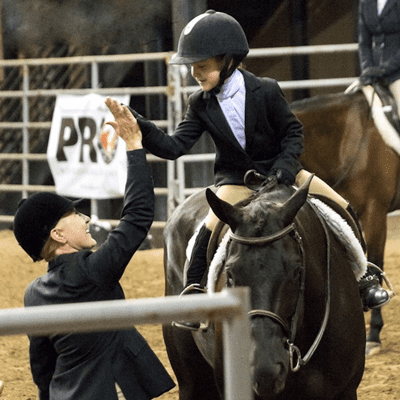Parents play the most important role in developing young riders. Parents do much more than haul their sons and daughters to lessons, arrange rides to and from the horse show and provide necessities. They are more than cheerleaders or providers, they nourish and shape children in their fold. Regardless of their level of involvement, parents are often the driving force behind a young rider’s ability to handle the pressures of competition.
It is wonderful to see parents take an active role in their child’s horse hobby and encourage their son or daughter’s progress. However, most parents walk a fine line between encouraging their children to achieve to the fullest and pushing too hard. If you are an adult with influence over a child’s riding and showing, here are ten tips to improve the experience for both parent and child.
1) Release your child to the coach.
This means you give the coach authority over practice, training and strategy. Letting the coach do his or her job is the child’s best chance for finding success. Undermining a coach’s plan with questions or strategies of your own leads to confusion from the child. Young children need and want to hear from one instructional perspective. The best coaches in the industry hire someone else to coach their own children. You cannot be both parent and coach at the same time.
2) Be a good role model.
Children want their parents to be model citizens on the sidelines. Kids embarrass easily and cringe from the negative attention brought on by a parent’s poor behavior. Parents who speak disparagingly about judges, criticize fellow competitors or break rules, send a message that it is okay to disrespect authority. Words have power. Use them positively – to instill confidence, to encourage good behavior and to instill a positive attitude in your child.
3) Keep things in perspective.
Everyone wants to win. That’s a given. You are not unique in your desire to see your child in the winner’s circle. But at the end of the day, it is just a horse show. This show is just one day in a lifetime of days. The experience will be remembered forever – the day, not so much.
4) Help your child set realistic goals.
Listen to your child, their goals may not be what you thought they were. You may love western pleasure but your daughter wants to jump. Talk to their coach to determine realistic expectations for young riders. Remember, everyone wants to win and with horse showing there is only one winner per class. Setting realistic goals ahead of time prevents disappointment from stealing the show.
5) Focus on performance not outcome.
Science proves time and again that performance-based evaluations improve success and increase confidence levels. Encourage and reward small steps towards improvement. Emphasize the importance of your child putting in their best efforts. Let the coach be the one to criticize the performance. Your role is supportive, to build confidence.
6) Give young riders space.
Horse shows are not a good environment for helicopter parents (parents who hover overhead). Beside the inherent risks involved in showing horses, horse show kids are under tremendous pressure to perform. Allow your child the space they need to prepare and to unwind after a performance. Children especially need time to recover – they will tell you about the missed diagonal when they are ready. Be there to listen, inspire and encourage. Mistakes are an integral part of advancement and everyone needs to digest mistakes in their own way and time.
7) Do something fun.
Horse shows encompass more than just showing horses. Encourage your son or daughter to participate in other activities, help with fundraisers, go to meet and greets, take in dinner with friends, a movie or go for a swim at the hotel. Everyone needs some down time and horse show kids are no different. Laughter releases endorphins that improve mood and performance.
8) Nourish their little bodies.
Horse show days are a whirlwind. It is easy to forget to eat or to suddenly realize it is well passed dinner time. Try to keep your child’s meal and sleep routine as close to normal as the horse show will allow. Crankiness is often the result of hunger or sleep deprivation. A good night’s sleep may well be more productive than another trip around the pen.
9) Develop relaxation techniques.
Practice stress reducing activities before the show. Establish a pattern of healthy responses to stressful situations away from the horse show. Teach your child how to take deep breaths to calm rattled nerves. Practice visualization – have your child imagine his or her perfect ride. On show day, recalling that memory can boost confidence and calm fears. Or remind your child of a situation they entered with apprehension that turned out well.
10) Avoid using the word “don’t”.
Speak only with positive directives. “Keep your eyes up”, “wait for the judges to look up” or ” stay tall in the corner”. Kids will remember the last thing you told them. When you say “don’t drop your eyes” the child remembers “drop your eyes” and promptly does as instructed – drop their eyes. Most important, tell your son or daughter how much you enjoy watching them show. I highly suggest reading http://outoftheboxstall.wordpress.com by Karen Waite, PhD. It is a wonderful read about the importance of telling your child how much you enjoy watching them perform.
Competition presents terrific learning opportunities. Winning involves independent decision making, self control, discipline and maturity. Horse shows encourage growth and push children to excel. They teach kids to set goals, to handle losses, to learn from their mistakes and to perform in front of an audience. All great tools children need as adults.
While the stress of showing causes some to rise to the occasion, too much stress can exhaust a child and lead to burnout. Overzealous parents often drive their kids away from the very thing they want most for the child. Kids want to satisfy but should never feel that winning is the only way to gain approval.
What adults teach children about competition – directly or indirectly – has a lasting effect on that child. Build confidence, teach your children trust, let them discover awareness and develop an ability to learn; then watch your child’s dreams come true.









